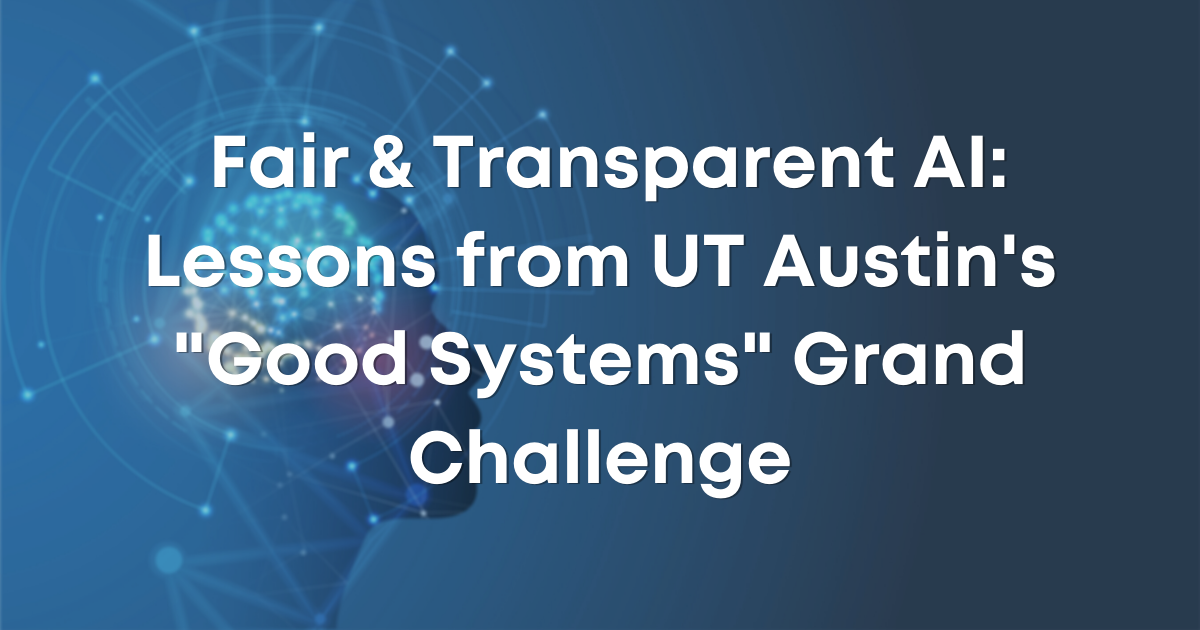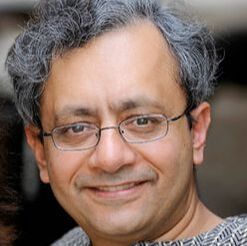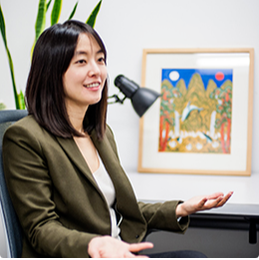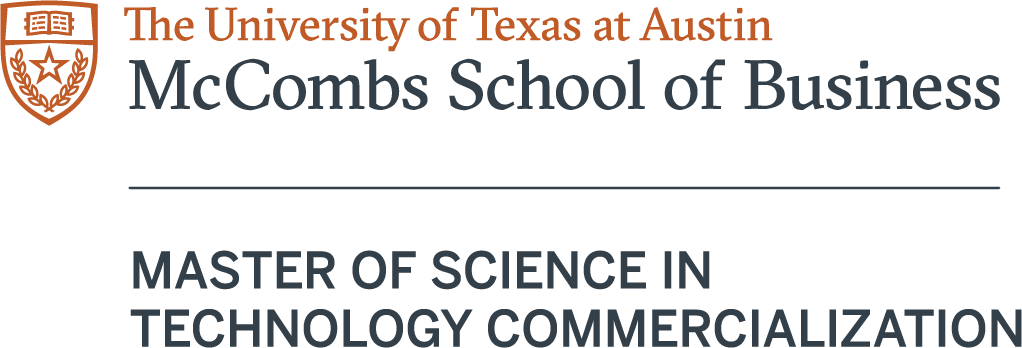|
Connect. Collaborate. Contribute.™
|
|
|
Fair & Transparent AI: Lessons from UT Austin's "Good Systems" Grand Challenge
April 20th, 2021 | Online via Zoom | 6:00pm Central Sponsored by Good Systems, A UT Grand Challenge |
|
Speakers
Matthew Lease The University of Texas at Austin, School of Information Maria De-Arteaga The University of Texas at Austin, Information, Risk and Operation Management Department Joydeep Ghosh The University of Texas at Austin, Department of Electrical and Computer Engineering and CognitiveScale Raymond J. Mooney The University of Texas at Austin, Department of Computer Science Min Kyung Lee, Ph.D. The University of Texas at Austin, School of Information |
Rapid advancement in artificial intelligence (AI) technologies has yielded more accurate predictions and greater capabilities than ever before. However, as AI technologies are more ubiquitously deployed, this is also raising new concerns about the extent to which AI technologies are impacting human lives. Firstly, ever-more sophisticated AI technologies have become increasingly opaque and hard to understand for those being affected by them. For someone to be able to effectively use and trust an AI system -- to combine their human skill and experience with AI speed and scalability -- some degree of AI transparency or interpretability seems necessary. Secondly, AI systems trained on biased data (drawn from our biased world) may not only perpetuate this bias but possibly amplify it further. Finally, these two issues can also compound: AI opacity can make it harder to even know if AI predictions are biased or not, not to mention making it unclear how to mitigate those biases if so.
UT Austin’s Good Systems is an eight year, $10 million dollar Grand Challenge to design responsible AI technologies. As part of this endeavor, we are working to create fair and transparent AI systems that people can easily use and rely on. This session of the Austin Forum will bring a panel of UT Austin faculty to share recent findings and lessons from developing fair and transparent AI technologies. In addition to being part of Good Systems, all of the faculty are also members of UT’s interdisciplinary Machine Learning Laboratory (https://ml.utexas.edu/) developing leading-edge AI technologies. |
speakERS
|
Matthew Lease received degrees in Computer Science from Brown University (PhD, MSc) and the University of Washington (BSc). His research on information retrieval and crowdsourcing was recognized by three Early Career awards: from the Defense Advanced Research Projects Agency (DARPA), the National Science Foundation (NSF), and the Institute for Museum and Library Sciences (IMLS). More recent honors include Best Student Paper at the 2019 European Conference for Information Retrieval (ECIR) and Best Paper at the 2016 Association for the Advancement of Artificial Intelligence (AAAI) Human Computation and Crowdsourcing conference (HCOMP). From 2010-2013, Lease ran benchmarking challenges for the National Institute of Standards and Technology (NIST) Text Retrieval Conference (TREC). Lease's industry experience includes stints at Intel Research, Computer game company HyperBole Studios, image compression startup LizardTech, crowdsourcing startup CrowdFlower, and Amazon.
|
|
Maria De-Arteaga
Professor The University of Texas at Austin, Information, Risk and Operation Management Department |
Maria De-Arteaga is an Assistant Professor at the Information, Risk and Operation Management Department at McCombs School of Business at the University of Texas at Austin. De- Arteaga is also a core faculty member in the interdepartmental Machine Learning Laboratory. She holds a joint PhD in Machine Learning and Public Policy from Carnegie Mellon University’s Machine Learning Department and Heinz College, where she was co-advised by Prof. Artur Dubrawski and Prof. Alexandra Chouldechova, and was a part of the Auton Lab.
De-Arteaga's research is focused on the risks and opportunities of algorithmic decision support in the context of sustainable societies. As part of her work, she characterizes how societal biases encoded in historical data may be reproduced and amplified by ML models, and develop algorithms to mitigate these risks. Moreover, the sensitive task of creating decision support tools is complicated by several other factors, such as the fact that experts often care about constructs that are not well captured in the available labels. In her research, she aims to understand the limits and risks of using ML in these contexts, and to develop human-centered ML that can improve expert decision-making. De-Arteaga is am currently Chair of Diversity & Inclusion for FAccT, Chair of the Steering Committee for ML4D, and local arrangements co-Chair for WITS 2021. |
|
Joydeep Ghosh
Professor The University of Texas at Austin, Department of Electrical and Computer Engineering and Chief Scientist CognitiveScale |
Joydeep Ghosh is currently the Schlumberger Centennial Chair Professor of Electrical and Computer Engineering at the University of Texas, Austin. He also serves as the Chief Scientist of CognitiveScale , which was selected in 2018 to be among the 61 technology pioneers worldwide by the World Economic Forum, among other recognitions.
Dr. Ghosh (Fellow, IEEE 2004) joined the UT-Austin faculty in 1988 after being educated at IIT Kanpur (B. Tech '83) and The University of Southern California (Ph.D '88). He is the founder-director of IDEAL (Intelligent Data Exploration and Analysis Lab) Dr. Ghosh has taught graduate courses on data mining and web analytics to both UT students and to industry, for over two decades. He was voted as "Best Professor" in the Software Engineering Executive Education Program at UT, and more recently (2019) by the MSBA program in the McCombs School of Business. He has also received several top awards for lifetime research contributions, including the IEEE CS Technical Achievement Award (2015) and ICDM Research Contributions Award (2020, Citation ). Dr. Ghosh's research interests lie primarily in data mining and web mining, responsible AI, scalable machine learning algorithms, specially for predictive and prescriptive analytics, and applications to a wide variety of complex real-world problems, including health informatics. He has published more than 500 refereed papers and 50 book chapters, and co-edited over 20 books. His research has been supported by the NSF, Yahoo!, Google, Paypal, ONR, ARO, AFOSR, Intel, IBM, etc. He has received 17 Best Paper Awards over the years, including the 2005 Best Research Paper Award across UT and the 1992 Darlington Award given by the IEEE Circuits and Systems Society for the overall Best Paper in the areas of CAS/CAD. Dr. Ghosh has been a plenary/keynote speaker at several venues including KDD, ICML,ICDM and ICHI, and has widely lectured on intelligent analysis of large-scale data. Dr. Ghosh served as the Conference Co-Chair or Program Co-Chair for several top data mining oriented conferences, including SDM'13, SDM'12, KDD 2011, CIDM07, ICPR'08 (Pattern Recognition Track) and SDM'06. He was the Conf. Co-Chair for Artificial Neural Networks in Engineering (ANNIE)'93 to '96 and '99 to '03 and the founding chair of the Data Mining Tech. Committee of the IEEE Computational Intelligence Society. He has also co-organized workshops on health informatics, high dimensional clustering, Web Analytics, Web Mining and Parallel/ Distributed Knowledge Discovery. Dr. Ghosh has served as a co-founder, consultant or advisor to successful startups (including Accordion Health, CognitiveScale and Neonyoyo) and as a consultant to large corporations such as IBM, TBS and Vinson & Elkins. |
|
As a member of the Artificial Intelligence Laboratory Raymond J. Mooney leads the Machine Learning Research Group which has explored a variety of areas, but my current focus is on natural language processing / computational linguistics.
In the fall of 1979, Mooney went to the University of Illinois in Champaign-Urbana to obtain a B.S. in Computer Engineering, followed by an M.S. and Ph.D. in Computer Science. In December 1987, I completed my Ph.D. thesis under the direction of Prof. Gerald DeJong and then began as a faculty member here in the Department of Computer Science at the University of Texas at Austin where I am enjoying the beginning of the fourth decade of a hopefully long academic career. |
|
Min Kyung Lee, Ph.D. is an assistant professor in the UT Austin School of Information. Lee conducts human-computer interaction research that combines computer science, design, and social science theories and methods. She directs a Human-AI Interaction lab.
In her research, she has leverage individual and collective human decision-making to envision technology for more just and empowering workplaces and cities. The projects explore psychological understandings of AI and develop human-centered methods and systems for better AI-integrated workplaces, smart communities and cities, and online information. UT Austin School on Information and Lee collaborate with the City of Austin, ECHO, and Dell Medical School. This work is possible thanks to the National Science Foundation, Good Systems, and Humanities Institute. |





















